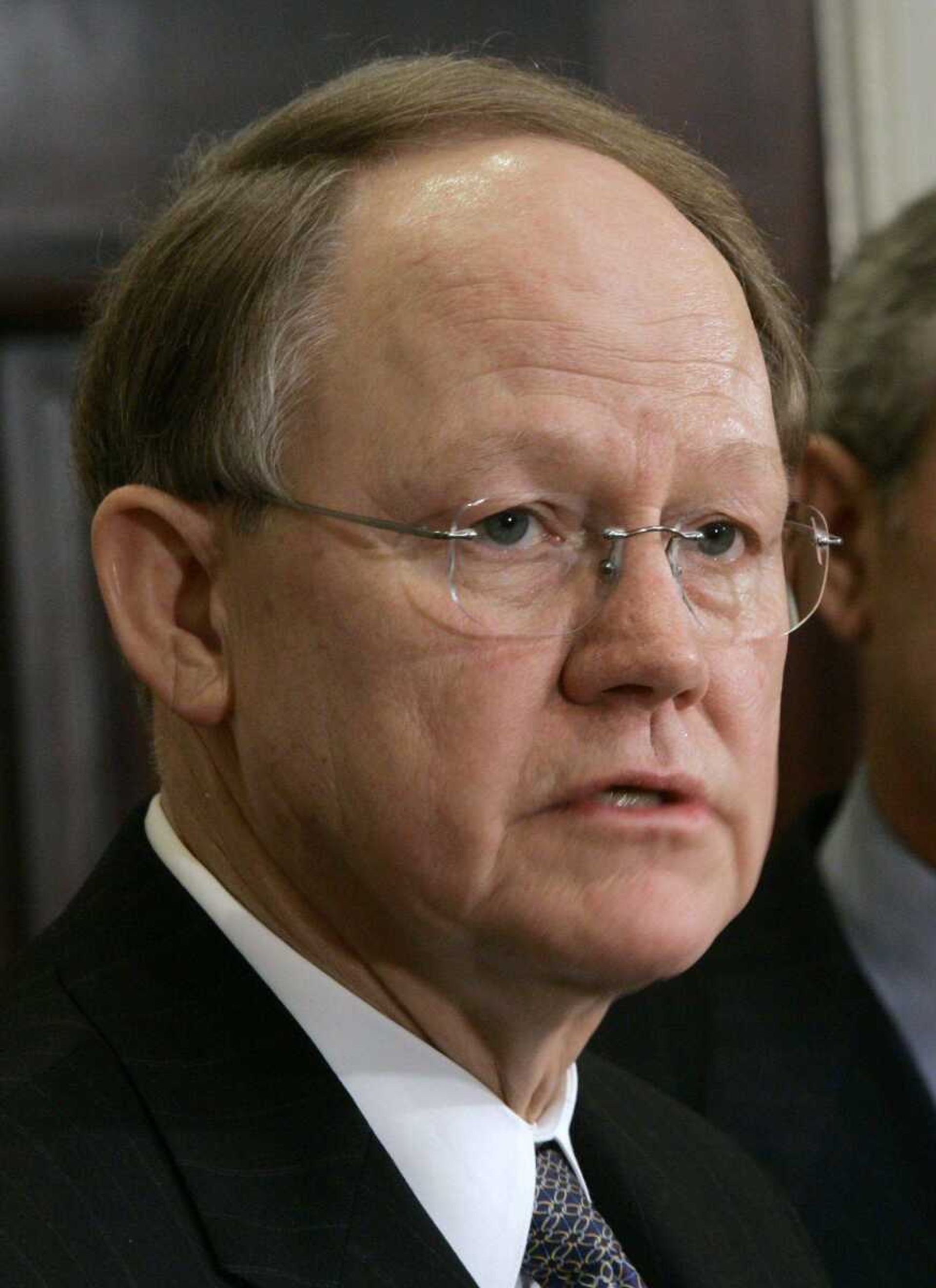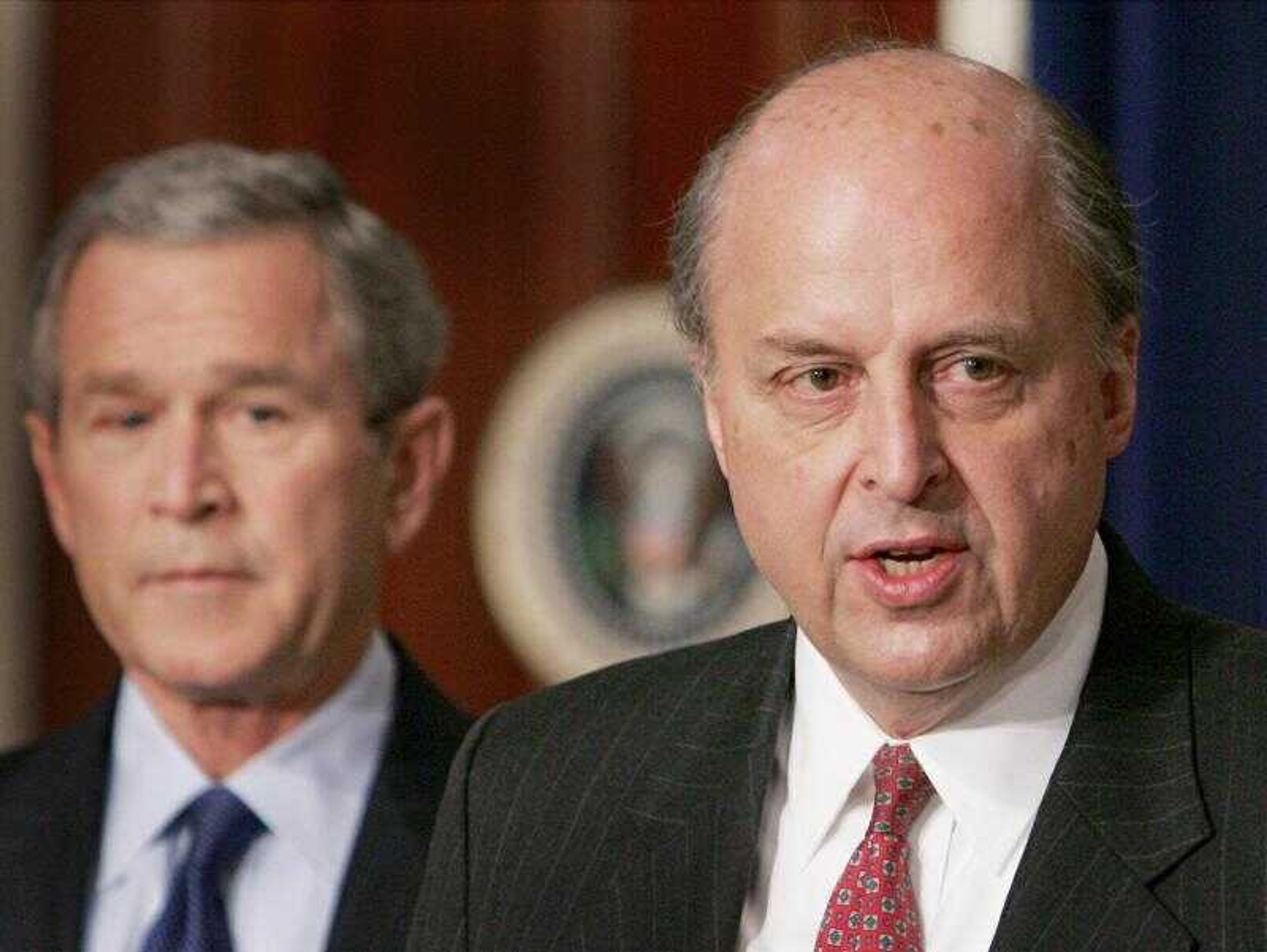Veteran former spy named to top intelligence slot as Bush reshapes security strategy
WASHINGTON -- President Bush nominated an intelligence veteran, former National Security Agency director Mike McConnell, to be the country's second national intelligence director. In a reshuffling of his national security team, Bush also chose his former top spymaster, John Negroponte, to be deputy secretary of state...
WASHINGTON -- President Bush nominated an intelligence veteran, former National Security Agency director Mike McConnell, to be the country's second national intelligence director. In a reshuffling of his national security team, Bush also chose his former top spymaster, John Negroponte, to be deputy secretary of state.
"Each of them will do good work in their new positions, and it is vital that they take up their new responsibilities promptly," Bush said on Friday.
"I would hope that they will be confirmed as quickly as possible," said the president, speaking to the new Senate now under Democratic control.
The moves come as part of the White House effort to chart a new direction on Iraq and reshape Bush's national security strategy with two years left in his presidency. The president plans to announce his new strategy for the war in a speech that could come as early as the middle of next week.
Part of the new course appears to be a renovation of Bush's intelligence and national security team. In addition to Negroponte's shift, Defense Secretary Robert Gates took over the Pentagon last month and is expected to bring in retired Lt. Gen. James Clapper as his undersecretary for intelligence.

Bush also is replacing his two top generals overseeing the Iraq war, a defense official said on the condition of anonymity.
If confirmed, McConnell said he looks forward to building on the accomplishments of Negroponte and his team, who have been in place just 20 months.
"Unlike just a decade ago, the threats of today and the future are moving at increasing speeds and across organizational and geographic boundaries," McConnell said, standing alongside Bush, Negroponte and Secretary of State Condoleezza Rice.
Bush said he was confident that McConnell would give him "the best information and analysis that America's intelligence community can provide."
State Department spokesman Sean McCormack said Negroponte, whose previously served as U.S. ambassador to Baghdad, will assume a weighty portfolio, including Iraq and North Korea.
Negroponte got his current intelligence job after the Sept. 11 Commission recommended in 2004 that Congress create a single official to coordinate all 16 spy agencies and avoid the mistakes made prior to the attacks of 2001. The prewar intelligence on Iraq only further tarnished the intelligence community's reputation.
Negroponte sought to put those chapters behind the agencies he oversees. "I believe our intelligence community has embraced the challenge of functioning as a single unified enterprise and reaffirmed the fact that it is the best intelligence community in the world," he said.
He also predicted "wise stewardship and success" as his successor continues the reform efforts. "Admiral McConnell will continue to drive forward the reforms we have initiated," he said.
A retired Navy vice admiral, McConnell spent more than a quarter-century as an intelligence operations and security officer. He was tapped to lead U.S. eavesdropping efforts as director of the NSA from 1992 to 1996.
Matthew Aid, a historian who studies the National Security Agency, said his record there was mixed. McConnell allowed Congress and the White House to slash NSA funding after the Cold War at a time when Aid said the government should instead have been ramping up for challenges posed by cell phones, the Internet and fiber-optic cable.
Yet, on McConnell's watch, the agency also became central to providing intelligence on the war in Bosnia, shipments of weapons-grade technology to Iraq and other tough issues of that era.
McConnell left the government and has worked for Booz Allen Hamilton, a government contractor and consulting firm, for about a decade.
Negroponte has been a diplomat in spy's clothing since he became the nation's first intelligence chief in April 2005, more comfortable in ambassadorial circles than the cloak-and-dagger world.
As Rice's deputy, he no longer would have first chair for a major government department or oversight of a $40 billion budget. But associates said the job of creating a new organization from scratch has had plenty of frustrations, from securing office space to planning foreign travel.
Negroponte has been at the center of Bush's Iraq strategy. He was the U.S. ambassador to the United Nations when then-Secretary of State Colin Powell made his now-infamous, error-filled presentation there in arguing for the invasion of Iraq. Negroponte became the U.S. ambassador to Iraq in June 2004, and was there for the January 2005 elections that Sunni Muslims boycotted.
Soon after, the White House asked him to take a job that others had already turned down because Congress didn't give the position enough power: national intelligence director.
Some doubted the wisdom of creating such a slot, worried it would only further weigh down an unwieldy bureaucracy. Negroponte leaves as the success or failure of that endeavor remains an open question.
Senate Intelligence Chairman Jay Rockefeller, D-W.Va., and the committee's top Republican, Kit Bond of Missouri, both said that a new intelligence chief must be in place before Negroponte leaves. "I am deeply troubled by the timing of this announcement and the void of leadership at the top of our intelligence community," Rockefeller said.
At least one key House Republican wasn't pleased with Bush's selection of a military man to run the spy community. The House intelligence committee's top Republican, Rep. Peter Hoekstra of Michigan, said he didn't mean to criticize McConnell personally.
Yet "the insistence of the administration to continually nominate career military officials to lead intelligence posts, however, leads me to question its commitment to including civilian oversight and input in the nation's intelligence community," Hoekstra said.
---
Associated Press writers Terence Hunt and Barry Schweid contributed to this report.
Connect with the Southeast Missourian Newsroom:
For corrections to this story or other insights for the editor, click here. To submit a letter to the editor, click here. To learn about the Southeast Missourian’s AI Policy, click here.








